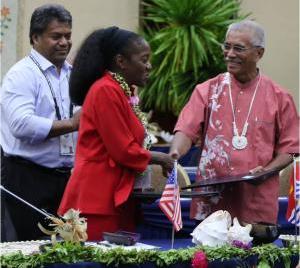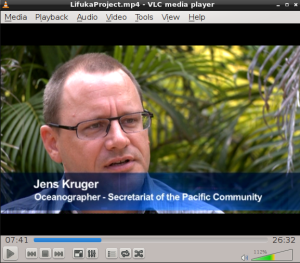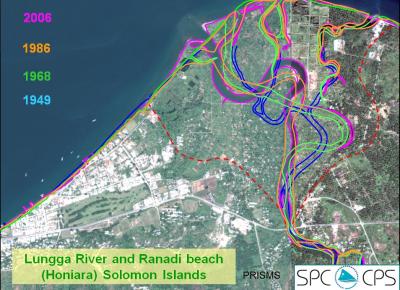United States and Kiribati Sign Maritime Boundary Treaty
Monday, 09 September 2013 17:41
administrator

Majuro, September 6, 2013 - This afternoon, the United States and the Republic of Kiribati signed a boundary treaty delimiting the waters between their two countries. The boundary treaty was signed on behalf of the United States by Ambassador Frankie A. Reed and, for the Republic of Kiribati, by President Anote Tong. The treaty was signed in Majuro, Marshall Islands, in connection with the Pacific Islands Forum.
During the signing ceremony Ambassador Reed said, “This maritime boundary treaty with Kiribati further highlights that the U.S. is a pacific nation. We look forward to deepening our already strong relationship with Kiribati here at the Forum and in November, during the 70th anniversary of the Battle of Tarawa.”
She added, “The negotiations leading up to this important moment were extremely cordial, productive, and efficient, and the U.S. team extends its appreciation to Kiribati’s representatives for the manner in which the two negotiating teams were able to work together in a spirit of collaboration. It was truly a pleasure to work together with Kiribati on this important endeavor.”
President Tong said, “The signing of this Maritime Boundary Delimitation Agreement between the Government of the United States of America and my country signify the vital importance of clearly establishing the national limits of jurisdictions under the 1982 United Nations Convention on the Law of the Sea (UNCLOS).
Last Updated on Monday, 16 September 2013 15:49
Read more...
|
Documentary: Lifuka Island – The Coastline of a Future Pacific
Friday, 06 September 2013 14:28
administrator

In May 2006 a magnitude 7.9 earthquake caused the western coastline of Tonga’s Lifuka Island to subside by 23cm. After this unique event Lifuka was chosen as part of a regional effort to understand how vulnerable Pacific Island communities can adapt to the impacts of rising sea levels.
The Australian-funded Pacific Adaptation Strategy Assistance Program enabled scientists to work closely with the Lifuka community to determine three main adaptation options: planned migration inland; sand replenishment and; the construction of an engineered revetment or seawall.
This film, which follows on from the first documentary ‘Rising Oceans: Changing Lives’, examines Lifuka’s struggle to make the tough choices needed to adapt to the changing coastline of a future Pacific.
WATCH NOW | DOWNLOAD (86Mb)
Last Updated on Tuesday, 10 September 2013 14:17
Read more...
The European Union launches €20 million programme to help build a climate resilient Pacific
Friday, 06 September 2013 07:52
administrator

05 September 2013, Majuro, Republic of the Marshall Islands - At the occasion of the Pacific Islands Forum (PIF), European Union Commissioner for Climate Action Mrs Connie Hedegaard and the Secretariat of the Pacific Community’s Director General Dr. Jimmie Rodgers and the Secretary General of the Secretariat of the African, Caribbean and Pacific (ACP) Group of States, Mr Alhaji Muhammad Mumuni, have signed the "ACP-EU Building Safety and Resilience in the Pacific" programme.
The European Union (EU) will provide 20 million Euro to support the Pacific states in addressing the impacts of climate change and the urgent need to improve resilience to natural disasters.
The high vulnerability of Pacific Island Countries to disaster is well known. This is further exacerbated by their often small land areas as well as their narrow, subsistence based fragile economies. Natural hazards undermine development and the achievements of the Millennium Development Goals (MDGs).
This Programme responds to these challenges and will strengthen the capacity of the Pacific states to address existing and emerging challenges with regard to the risks posed by natural hazards and related disasters, while maximising synergies between disaster risk reduction (DRR) and climate change adaptation (CCA).
"For the Pacific people, climate change is not about a distant future. It has become the new normal. This programme will help the Pacific states in their efforts to adapt to this new climate reality. The Pacific states can count on Europe to continue its climate cooperation in the region”, said European Climate Action Commissioner Connie Hedegaard.
Last Updated on Friday, 06 September 2013 07:59
Read more...
|
Disaster Risk Management and Damage Assessment in Noumea
Thursday, 05 September 2013 09:51
administrator

Disaster risk management and damage assessment: a training session for those working in those areas in New Caledonia
A disaster risk management and damage assessment training session is being held this week at the Secretariat of the Pacific Community (SPC) Headquarters in Noumea. It is being run by SPC trainers who are disaster risk specialists and by civil safety officials from Vanuatu and Fiji.
This training programme responds to a request from the New Caledonian Government and is comes within the framework of the French Government’s transfer of powers for the civil protection area to New Caledonian authorities. It is designed to build knowledge about risk prevention/mitigation and post-disaster response. It also provides a window onto the disaster risk management models that exist in other countries in the region.
Funded by The Asia Foundation and USAID (with the support of the European Union for the session in New Caledonia), over the past 15 years this training course has been held in 14 Pacific countries and territories with more than 7000 participants. The region faces many hazards such as tropical cyclones, flooding and tsunamis, which are often devastating and costly for the Pacific islands, so this training course helps ensure improved disaster risk management.
For further information, please contact: Jean-Noël Royer, SPC Assistant Communications Officer:
This e-mail address is being protected from spambots. You need JavaScript enabled to view it
, tel. (direct line) 26 01 71:
This e-mail address is being protected from spambots. You need JavaScript enabled to view it
Last Updated on Thursday, 05 September 2013 09:59
Scientific assessment critical to adaptation planning
Thursday, 29 August 2013 17:13
administrator

22 August 2013 - Secretariat of the Pacific Community - Suva, Fiji - Better preparing communities for cyclones, floods, droughts, and predicted sea level rise is a top priority for many Pacific island nations. The urgency to prepare however, does not justify cutting corners.
Climate change adaptation planning should follow the same national processes as any development, with environmental impact assessments, technical surveys, and cost benefit analyses.
This was the argument Dr. Arthur Webb of the Secretariat of the Pacific Community’s Applied Geo Science and Technology Division (SOPAC) presented to a diverse audience of students, academics and development practitioners at USP Marine Science Campus on Thursday 17th August.
“Nine out of ten communities want a sea wall,” said Dr. Webb, an expert in coastal processes, “but putting concrete over a healthy beach system is an example of maladaptation. It will do more harm than good. Not only will it disrupt the flow of sediments, in many cases increasing erosion, but it’s terrible for tourism.”
Webb displayed examples of maladaptation that had been carried out in the Pacific. In one instance, mangroves were planted on an atoll coastline where they were not naturally occurring.
Last Updated on Thursday, 29 August 2013 17:19
Read more...
|
|
|
|
|
|
Page 20 of 74 |











